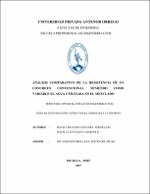Mostrar el registro sencillo del ítem
Análisis comparativo de la resistencia de un concreto convencional teniendo como variable el agua utilizada en el mezclado
| dc.contributor.advisor | Durand Orellana, Rocio del Pilar | |
| dc.contributor.author | Cruzado Guevara, Jorge Luis | |
| dc.contributor.author | Li Zavaleta, Marcelo | |
| dc.creator | Cruzado Guevara, Jorge Luis | |
| dc.date.accessioned | 2016-11-03T20:59:52Z | |
| dc.date.available | 2016-11-03T20:59:52Z | |
| dc.date.issued | 2016 | |
| dc.identifier.uri | https://hdl.handle.net/20.500.12759/2038 | |
| dc.description.abstract | En el presente proyecto de investigación, se trabajó en la comparación de las resistencias a compresión de testigos de concreto f´c=210 kg/cm2, elaborados con diferentes tipos de agua (potable, de río y del subsuelo), utilizando cemento Pacasmayo Extraforte y agregados de la cantera “Gelacho” – Laredo para determinar su comportamiento mecánico y como este varia. Para llevar a cabo este proyecto se elaboraron y ensayaron cilindros de concretos a edades de 7, 14 y 28 días con el fin de analizar los distintos resultados y así poder compararlos con los límites que permite la norma. Al agua se le hicieron estudios físico-químicos para determinar el tipo de sustancias o agentes contaminantes se encontraban en está para tener una idea de los efectos que produciría en la resistencia del concreto, los agregados se caracterizaron y se determinaron sus propiedades físicas. Seguido a esto se hizo el ensayo de manejabilidad (asentamiento) para medir la consistencia del concreto fresco, se fabricaron las probetas de concreto variando el tipo de agua utilizada en diseños de mezcla para 210 kg/cm2 y por último se realizaron los ensayos de resistencia a la comprensión para corroborar si los cilindros llegaban a las resistencias esperadas y que variación existe entre estos de acuerdo al agua utilizada. Los resultados, indican que el agua subterránea obtuvo la mayor resistencia, alcanzando la resistencia promedio de 238 kg/cm2, el agua potable alcanzó la resistencia promedio de 226 kg/cm2, mientras que la resistencia obtenida utilizando el agua de río Moche fue de 186 kg/cm2, siendo esta la opción menos apropiada a utilizar en concretos sin previo tratamiento. | es_PE |
| dc.description.abstract | In this research project, working on comparing the compressive strength of concrete witnesses fc = 210 kg / cm2, made with different types of water (drinking, river and groundwater), using Pacasmayo cement Extraforte and aggregates quarry “Gelacho” - Laredo to determine its mechanical behavior and how this varies. To carry out this project were developed and tested concrete cylinders ages 7, 14 and 28 days in order to analyze the different results so you can compare them to the limits permitted by the standard. Water it became physical-chemical studies to determine the type of substances or pollutants were in this to get an idea of the impact it would have on the strength of concrete, aggregates were characterized and their physical properties were determined. Following this test handling (settlement) was to measure the consistency of fresh concrete, concrete specimens were produced by varying the type of water used in mix designs to 210 kg / cm2 and finally strength tests were performed to corroborate the understanding reached cylinders if the expected resistance and variation between these according to the water used. The results will indicate that groundwater had the highest resistance, reaching the average strength of 238 kg / cm2, the water reached the average strength of 226 kg / cm2, while the resistance obtained using water Moche river was 186 kg / cm2, and this is the least appropriate option to use in concrete without treatment. | en_US |
| dc.description.uri | Tesis | es_PE |
| dc.format | application/pdf | es_PE |
| dc.language.iso | spa | es_PE |
| dc.publisher | Universidad Privada Antenor Orrego | es_PE |
| dc.relation.ispartofseries | T_ING.CIVIL_1338 | |
| dc.rights | info:eu-repo/semantics/openAccess | es_PE |
| dc.rights.uri | https://creativecommons.org/licenses/by/4.0/ | es_PE |
| dc.source | Universidad Privada Antenor Orrego | es_PE |
| dc.source | Repositorio Institucional - UPAO | es_PE |
| dc.subject | Análisis comparativo | es_PE |
| dc.subject | Resistencia | es_PE |
| dc.title | Análisis comparativo de la resistencia de un concreto convencional teniendo como variable el agua utilizada en el mezclado | es_PE |
| dc.type | info:eu-repo/semantics/bachelorThesis | es_PE |
| thesis.degree.level | Título Profesional | es_PE |
| thesis.degree.grantor | Universidad Privada Antenor Orrego. Facultad de Ingeniería | es_PE |
| thesis.degree.name | Ingeniero Civil | es_PE |
| thesis.degree.discipline | Ingeniería Civil | es_PE |
| dc.subject.ocde | https://purl.org/pe-repo/ocde/ford#2.01.00 | |
| renati.type | https://purl.org/pe-repo/renati/type#tesis | |
| renati.level | https://purl.org/pe-repo/renati/level#tituloProfesional | |
| dc.publisher.country | PE | es_PE |
Ficheros en el ítem
Este ítem aparece en la(s) siguiente(s) colección(es)
-
Ingeniería Civil [1260]


